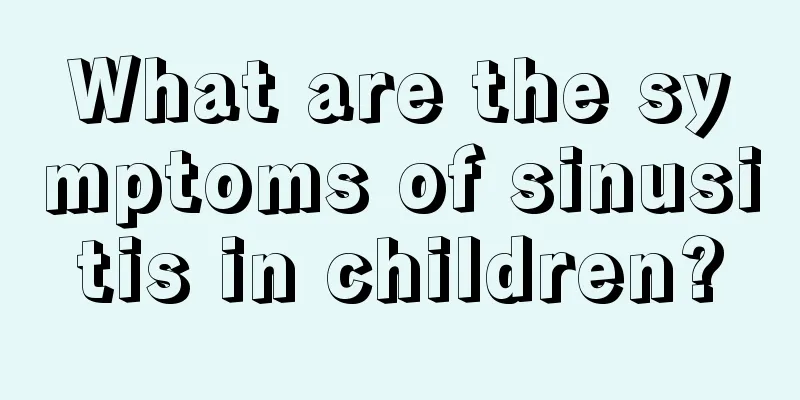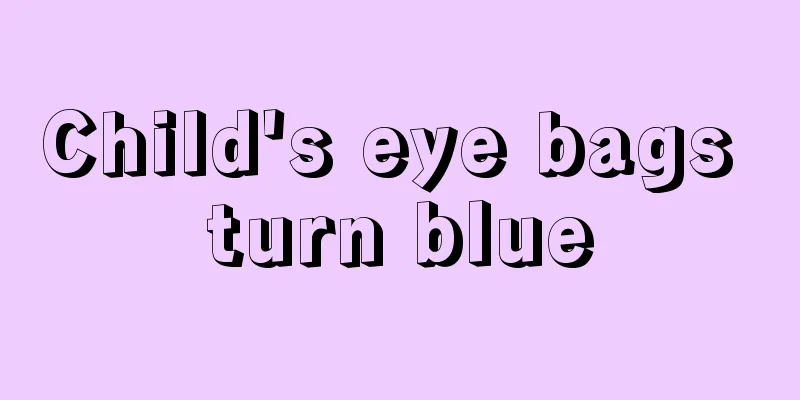What to do if your baby has phlegm in his nose

|
Babies often have a lot of phlegm due to getting angry or having a cold. Parents will find that there is always a gurgling sound when the baby breathes. At this time, there will be some secretions in the baby's nasal cavity. Even if these secretions are completely cleared, it will help relieve the baby's feeling of shortness of breath. In addition, you must understand the specific cause of the disease. Even if you use medication for treatment, you should drink more water in normal times. The reason why there is phlegm in the baby's nasal cavity The baby's nasal mucosa is thin and tender. When the baby gets sick or has a cold, or is stimulated by the outside world (sensitive to external substances such as pollen, air, clothing, etc.), it is easy for the nasal mucosa to become congested, swollen, and produce secretions. In addition, the lumens of the upper respiratory tract (nasal cavity, oral cavity and throat) are relatively narrow, and even a little secretion can cause nasal congestion. When the baby's nasal cavity is blocked, it may cause a "snoring" sound, like there is phlegm, so you can check the baby's nasal cavity. Sometimes, due to increased natural secretions in the mouth and throat, such as excessive saliva in babies who are not very good at swallowing, and underdeveloped respiratory diaphragms in the chest, when respiratory air flows in and out of the trachea, air and water mix, producing respiratory murmurs that sound like phlegm. This condition has no adverse effect and will improve with development. If it lasts a long time and is very severe, especially if it occurs during sleep, it may be laryngeal cartilage hypoplasia and you need to see a doctor. What to do if your baby has phlegm in his nose When the baby has a stuffy nose, you can apply a hot towel to the nose. When there are hard nasal crusts, spray some liquid (such as saline, breast milk or a little vegetable oil) into the baby's nasal cavity. Vegetable oils can be olive oil or sesame oil. When using olive oil, pay attention to whether there is an allergic reaction. Once the secretions in the nasal cavity soften, they will be discharged when the baby sneezes or will be discharged naturally after softening. If it affects breastfeeding (crying, face flushed, breathing is blocked, and breathing is difficult when mouth closed), the doctor must prescribe some medication (such as nasal drops) for treatment or use a suction device to suck it out. After the editor's introduction, I believe you have already understood that, in fact, phlegm in the baby's nasal cavity usually occurs when the baby is 0-4 months old. After 4 months, when the baby's nasal cavity and throat passages develop wider, there will be improvement. Therefore, mothers must observe their baby's nose and oral condition regularly. |
<<: What should I do if my child is afraid of people and timid?
>>: What to do if your child swallows gum
Recommend
What to do if your one-year-old baby has a rash
The physique of a newborn is relatively fragile. ...
Symptoms of mental illness in children
Nowadays, mental health issues are receiving more...
What are the reasons for itchy ears in children?
The ears are a part of the body that people pay m...
What to do if your child has heel pain
As the times change, there are more and more skys...
What should children with poor eyesight eat?
Nowadays, many children suffer from myopia or hyp...
How to solve the problem of red, swollen and bleeding gums in babies
The baby's gums are red, swollen and bleeding...
What to do if a one-month-old baby has a fever of 37.7
The biggest headache for many young parents is th...
What should I do if my seven-month-old baby has repeated fevers?
Fever is a disease that is relatively harmful to ...
What to do if breast milk is insufficient at six months
Babies aged six months can generally start to eat...
How long can a four-month-old baby lie on his stomach?
When the baby is four months old, the height and ...
The location and causes of headaches in children
When children have headaches, parents must pay at...
Is it okay for babies to drink rock sugar water?
Parents all know that giving sugar to babies is b...
What to do if there are red spots on the baby's eyelids
Babies have special physiques. They are susceptib...
White spots on baby's skin
We all know that if there are large patches of wh...
The baby only has two teeth at ten months old
Newborns have no teeth when they are just born. W...









